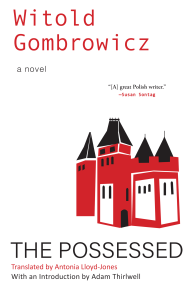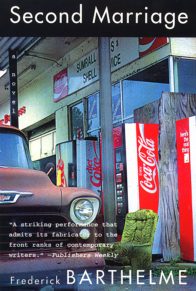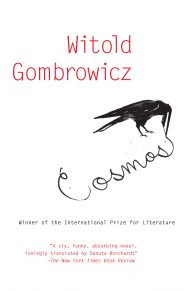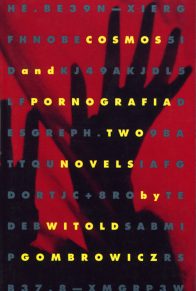I’ll tell you about yet another adventure of mine, probably one of the most disastrous. At the time—the year was 1943—I was living in what was once Poland and what was once Warsaw, at the rock-bottom of an accomplished fact. Silence. The thinned-out bunch of companions and friends from the former cafés—the Zodiac, the Ziemiańska, the Ipsu—would gather in an apartment on Krucza Street and there, drinking, we tried hard to go on as artists, writers, and thinkers . . . picking up our old, earlier conversations and disputes about art. . . . Hey, hey, hey, to this day I see us sitting or lying around in thick cigarette smoke, this one somewhat skeleton-like, that one scarred, and all shouting, screaming. So this one was shouting: God, another: art, a third: the nation, a fourth: the proletariat, and so we debated furiously, and it went on and on—God, art, nation, proletariat—but one day a middle-aged guy turned up, dark and lean, with an aquiline nose and, observing all due formality, he introduced himself to everyone individually.
After which he hardly spoke.
He scrupulously thanked us for the glass of vodka we offered him—and no less scrupulously he said: “I would also like to ask you for a match . . .” Whereupon he waited for the match, and he waited . . . and, when given it, he proceeded to light his cigarette. In the meantime the discussion raged—God, proletariat, nation, art—while the stench was peeking into our nostrils. Someone asked: “Fryderyk, sir, what winds have blown you here?” —to which he instantly gave an exhaustive reply: “I learned from Madame Ewa that Piętak frequently comes here, therefore I dropped in, since I have four rabbit pelts and the sole of a shoe.” And, to show that these were not empty words, he displayed the pelts, which had been wrapped in paper.
He was served tea, which he drank, but a piece of sugar remained on his little plate—so he reached for it to bring it to his mouth—but perhaps deeming this action not sufficiently justified, he withdrew his hand—yet withdrawing his hand was something even less justified—so he reached for the sugar again and ate it—but he probably ate it not so much for pleasure as merely for the sake of behaving properly—towards the sugar or towards us?—and wishing to erase this impression he coughed and, to justify the cough, he pulled out his handkerchief, but by now he didn’t dare wipe his nose—so he just moved his leg. Moving his leg presented him, it seemed, with new complications, so he fell silent and sat stock-still. This singular behavior (because he did nothing but “behave,” he incessantly “behaved”) aroused my curiosity even then, on first meeting him, and in the ensuing months I became close to this man, who actually turned out to be someone not lacking refinement, he was someone with experience in the realm of art as well (at one time he was involved in the theater). I don’t know . . . I don’t know . . . suffice it to say that we both became involved in a little business that provided us with a livelihood. Well, yes, but this did not last long, because one day I received a letter, a letter from a person known as Hipolit, Hipolit S., a landowner from the Sandomierz region, suggesting that we visit him—Hipolit also mentioned that he would like to discuss some of his Warsaw affairs in which we could be helpful to him. “Supposedly it’s peaceful here, nothing of note, but there are marauding bands, sometimes they attack, there’s a loosening of conduct, you know. Come, both of you, we’ll feel safer.”
Travel there? The two of us? I was beset by misgivings, difficult to express, about the two of us traveling . . . because to take him there with me, to the countryside, so that he could continue his game, well . . . And his body, that body so . . . “peculiar”? . . . To travel with him and ignore his untiring “silently-shouting impropriety”? . . . To burden myself with someone so “compromised and, as a result, so compromising”? . . . To expose myself to the ridicule of this stubbornly conducted “dialogue” . . . with . . . with whom actually? . . . And his “knowledge,” this knowledge of his about . . . ? And his cunning? And his ruses? Indeed, I didn’t relish the idea, but on the other hand he was so isolated from us in that eternal game of his . . . so separate from our collective drama, so disconnected from the discussion “nation, God, proletariat, art” . . . that I found it restful, it gave me some relief. . . . At the same time he was so irreproachable, and calm, and circumspect! Let’s go then, so much more pleasant for the two of us to go together! The outcome was that—we forced ourselves into a train compartment and bore our way into its crowded interior . . . until the train finally moved, grinding.
Three o’clock in the afternoon. Foggy. A hag’s torso splitting Fryderyk in half, a child’s leg riding onto his chin . . . and so he traveled . . . but he traveled, as always, correctly and with perfect manners. He was silent. I too was silent, the journey jerked us and threw us about, yet everything was as if set solid . . . but through a bit of the window I saw bluish-gray, sleeping fields that we rode into with a swaying rumble. . . . It was the same flat expanse I’ve seen so many times before, embraced by the horizon, the checkered land, a few trees flying by, a little house, outbuildings receding behind it . . . the same things as ever, things anticipated . . . Yet not the same! And not the same, just because the same! And unknown, and unintelligible, indeed, unfathomable, ungraspable! The child screamed, the hag sneezed . . .
The sour smell . . . The long-familiar, eternal wretchedness of a train ride, a stretch of sagging power lines, of a ditch, the sudden incursion of a tree into the window, a utility pole, a shed, the swift backward dash of everything, slipping away . . . while there, far, on the horizon a chimney or a hill . . . appeared and persisted for a long time, stubbornly, like a prevailing anxiety, a dominant anxiety . . . until, with a slow turning, it all fell into nothing. I had Fryderyk right in front of me, two other heads separating us, his head was close, close by, and I could see it—he was silent and riding on—while the presence of alien, brazen bodies, crawling and pressing on us, only deepened my tête-à-tête with him . . . without a word . . . so much so that, by the living God, I would have preferred not to be traveling with him, oh, that the idea of traveling together had never come to pass! Because, stuck in his corporality, he was one more body among other bodies, nothing more . . . but at the same time here he was . . . and somehow here he was, distinctly and unremittingly. . . . This was not to be dismissed—not to be discarded, disposed of, erased. Here he was in this crush and here he was. . . . And his ride, his onward rush in space, was beyond comparison with their ride—his was a much more significant ride, even sinister perhaps. . . .
From time to time he smiled at me and said something—probably just to make it bearable for me to be with him and make his presence less oppressive. I realized that pulling him out of the city, casting him onto these out-of-Warsaw spaces, was a risky undertaking . . . because, against the background of these expanses, his singular inner quality would necessarily resound more powerfully . . . and he himself knew it, since I had never seen him more subdued, insignificant. At a certain moment the dusk, the substance that consumes form, began gradually to erase him, and he became indistinct in the speeding and shaking train that was riding into the night, inducing nonexistence. Yet this did not weaken his presence, which became merely less accessible to the eye: he lurked behind the veil of nonseeing, still the same. Suddenly lights came on and pulled him back into the open, exposing his chin, the corners of his tightly drawn mouth, his ears. . . . He, nonetheless, did not twitch, he stood with his eyes fixed on a string that was swaying, and he just was! The train stopped again, somewhere behind me the shuffling of feet, the crowd reeling, something must be happening—and he just was and was! We begin moving, it’s night outside, the locomotive flares out sparks, the compartments’ journey becomes nocturnal—why on earth have I brought him with me? Why have I burdened myself with his company, which, instead of unburdening me, burdened me? The journey lasted many listless hours, interspersed with stops, until finally it became a journey for journey’s sake, somnolent, stubborn, and so we rode until we reached Ćmielowo and, with our suitcases, we found ourselves on a footpath running along the train track, the train’s disappearing string of cars in the clangor dying away. Then silence, a mysterious breeze, and stars. A cricket.
I, extricated from many hours of motion, of crowding, was suddenly set down on this little footpath—next to me Fryderyk, his coat on his arm, totally silent and standing—Where were we? What was this? I knew this area, the breeze was not foreign to me—but where were we? There, diagonally across, was the familiar building of the Ćmielowo train station and a few lamps shining, yet . . . where, on what planet, had we landed? Fryderyk stood next to me and just stood. We began to move toward the station, he behind me, and here are a carriage, horses, a coachman—the familiar carriage and the coachman’s familiar raising of his cap, why then am I watching it all so stubbornly? . . . I climb up, Fryderyk after me, we ride, a sandy road by the light of a dark sky, the blackness of a tree or of a bush floats in from the sides, we drive into the village of Brzustowa, the boards glow with whitewash, a dog is barking . . . mysterious . . . in front of me the coachman’s back . . . mysterious . . . and next to me this man who is silently, affably accompanying me. The invisible ground at times rocked our vehicle, at times shook it, while caverns of darkness, the thickening murkiness among the trees, obstructed our vision. I talked to the coachman just to hear my own voice:
“Well, how’s it going? Is it peaceful over your way?”
And I heard him say:
“It’s peaceful for the moment. There are gangs in the forests. . . . But nothing special lately. . . .”
The face invisible, the voice the same—yet not the same. In front of me only his back—and I was about to lean forward to look into the eyes of his back, but I stopped short . . . because Fryderyk . . . was indeed here, next to me. And he was immensely silent. With him next to me, I preferred not to look anyone in the face ” because I suddenly realized that this something sitting next to me is radical in its silence, radical to the point of frenzy! Yes, he was an extremist! Reckless in the extreme! No, this was not an ordinary being but something more rapacious, strained by an extremity about which thus far I had no idea! So I preferred not to look in the face—of anyone, not even the coachman’s, whose back weighed me down like a mountain, while the invisible earth rocked the carriage, shook it, and the surrounding darkness, sparkling with stars, sucked out all vision. The remainder of the journey passed without a word. We finally rolled into an avenue, the horses moved more briskly—then the gate, the caretaker, and the dogs—the locked house and the heavy grating of its unlocking—Hipolit with a lamp . . .
“Well, thank God you’re here!”
Was it he or not? The bloated redness of his cheeks, bursting, struck me and repelled me. . . . He seemed to be generally bursting with edema, which made everything in him expand enormously and grow in all directions, the awful blubber of his body was like a volcano disgorging flesh . . . in knee boots, he stretched out his apocalyptic paws, and his eyes peeped from his body as if through a porthole. Yet he wanted to be close to me, he hugged me. He whispered bashfully:
“I’m all bloated . . . devil only knows . . . I’ve grown fat. From what? Probably from everything.”
And looking at his thick fingers he repeated with boundless anguish, more softly, to himself:
“I’ve grown fat. From what? Probably from everything.”
Then he bellowed:
“And this is my wife!”
Then he muttered for his own benefit:
“And this is my wife.”
Then he screamed:
“And this is my Henia, Hennie, Hennie-girl!”
Then he repeated, to himself, barely audibly:
“And this is Henia, Hennie, Hennie-girl!”
He turned to us, hospitably, his manner refined: “How good of you to come, but please, Witold, introduce me to your friend . . .” He stopped, closed his eyes, and kept repeating . . . his lips moved. Fryderyk, courteous in the extreme, kissed the hand of the hostess, whose melancholy was embellished with a faraway smile, whose litheness fluttered lightly . . . and the whirl of connecting, introducing us into the house, sitting, conversing, drew us in—after that journey without end—the light of the lamp induced a dreamy mood. Supper, served by a butler. We were overcome with sleep. Vodka. Struggling against sleep, we tried to listen, to grasp, there was talk of aggravation by the Underground Army on the one hand, by the Germans on the other, by gangs, by the administration, by the Polish police, and seizures—talk of rampant fears and rapes . . . to which the shutters, secured with additional iron bars, bore witness, as did the blockading of side doors . . . the locking and bunging up with iron. “They burned down Sieniechów, they broke the legs of the overseer of the farm laborers in Rudniki, I had people here who were displaced from the Poznań region, what’s worse, we know nothing of what’s happening in Ostrowiec, in Bodzechów with its factory settlements, everybody’s just waiting, ears to the ground, for the time being it’s quiet, but everything will come crashing down when the front comes closer . . . Crashing down! Well, sir, there will be carnage, an eruption, ugly business! It will be an ugly business!” he bellowed and then muttered to himself, absorbed in thought:
“An ugly business.”
And he bellowed:
“The worst of it is there’s no place to run!”
And he whispered:
“The worst of it is there’s no place to run!”
But here’s the lamp. Supper. Sleepiness. Hipolit’s enormousness besmeared with a thick sauce of sleep, the lady of the house is here as well, dissolving in her remoteness, and Fryderyk, and moths hitting the lamp, moths inside the lamp, moths around the lamp, and the stairs winding upward, a candle, I fall onto my bed, I’m falling asleep. The following day there’s a triangle of sunlight on the wall. Someone’s voice outside the window. I rose from my bed and opened the shutters. Morning.













